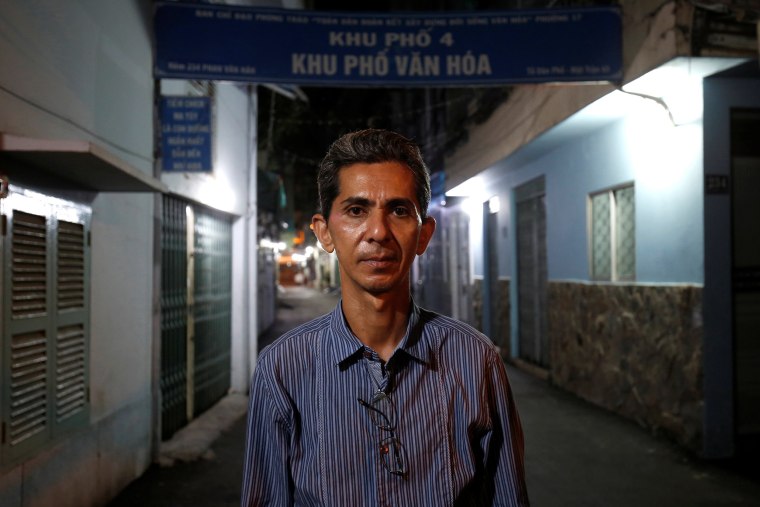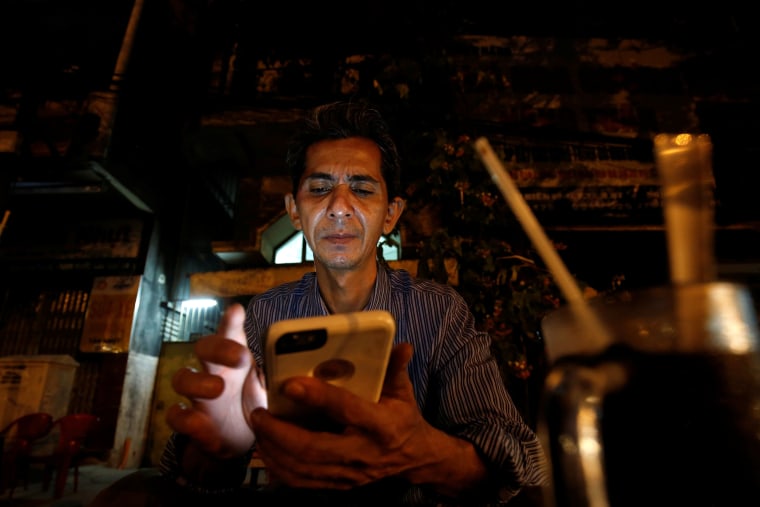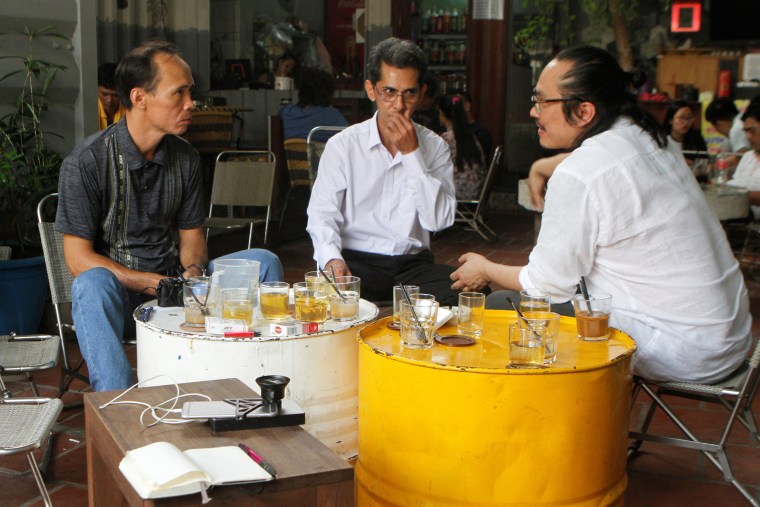A few days before Christmas last year, Cuong Pham boarded a plane in Texas to fly to his home country of Vietnam, he said.
He had last visited the country about a decade before, but this time, Pham wouldn't be returning to the U.S., where his wife and three children live. He was being deported.
Pham didn’t want to go back, he said, “because all my life is in the U.S. It's not here.”
I want to go back to my family, my wife and children…. I don’t even know what I’m going to do next.
Pham was one of a small number of Vietnamese nationals who were deported last December despite a bilateral agreement that apparently excludes them from being deported, according to several immigration and civil rights advocates.
In 2008, the U.S. and Vietnam signed a repatriation agreement that explicitly excludes Vietnamese nationals who arrived in the U.S. before July 12, 1995 — the date the two countries reestablished diplomatic relations — from being subject to deportation. Many of those who arrived before that date were refugees of the Vietnam War.
But civil rights and immigration groups say they believe that seven Vietnamese nationals who arrived in the U.S. before 1995 were deported late last year and early this year.
“Many of them have never been back to Vietnam and many of them don’t have any family there,” Phi Nguyen — litigation director of Asian Americans Advancing Justice-Atlanta (Advancing Justice-Atlanta), which earlier this year filed a lawsuit challenging the detention of Vietnamese nationals not covered under the 2008 agreement — said. “The idea of being returned to a place that they are no longer connected to is causing a lot of fear in the community, especially when people who are in this situation have felt safe for the last several years and have been able to rebuild their life here and create families here.”
'Amerasian' Homecoming
Pham, 47, was born in Vietnam and grew up there until he was 20 years old, immigrating to the United States in 1990, he said. The son of a U.S. serviceman, Pham said he came to the U.S. under the Amerasian Homecoming Act, a law that allows some Vietnamese nationals whose fathers were U.S. citizens as well as their next of kin to immigrate to the U.S.
Pham received his final order of removal in 2009 following two convictions, he said. In 2000, he was convicted of indecent assault and battery of children under 14, a sex crime. In 2007, he was convicted of driving under the influence.

Since arriving in Vietnam, Pham has settled in a rural area of the country he described as a “jungle” where there is no running water. He said he has had difficulty in securing a job over the last four-and-a-half months as employers have rejected his inquiries based on his multiracial status. His wife has provided him with some financial assistance, but is also working to support their three children.
“For me, right now it’s a very, very hard time,” he said by phone from Vietnam. “I want to go back to my family, my wife and children…. I don’t even know what I’m going to do next.”
Reuters last month reported that former U.S. Ambassador to Vietnam Ted Osius said a “small number” of people protected by the repatriation agreement have been sent back.
Osius did not respond to a request for comment.
Immigration and Customs Enforcement (ICE) spokesperson Brendan Raedy said in an email that “both countries maintain and continue to discuss their respective legal positions relative to Vietnamese citizens who departed Vietnam for the United States prior to July 12, 1995.”
The U.S. Department of State did not directly address the deportations when contacted by NBC News. Department spokesperson Ambrose Sayles said that the removal of aliens subject to a final order of removal, particularly those who pose a danger to national security or public safety, is a top priority for the U.S. government.
“We continue to work closely with Vietnamese authorities to address this issue. ... The U.S. Government and the Vietnamese Government continue to discuss their respective positions relative to Vietnamese citizens who departed Vietnam for the United States,” Sayles said in an email.
'It's entirely up to Vietnam'
Bill Ong Hing, a professor of law at the University of San Francisco who specializes in immigration law and policy, said that agreements such as the one between the U.S. and Vietnam that should exempt certain individuals from deportation are not law, but rather serve as guidelines that don't necessarily need to be followed.
“In spite of the agreement, it's entirely up to Vietnam,” he said. “What usually happens is that the receiving country is not willing to take the people. But if the receiving country is willing to take the person, then there's not much that can be done about that.”
A receiving country could be pressured into accepting or decide to accept deportees for various reasons, Hing noted.
He said it has been and remains uncommon for the repatriation of individuals protected under such agreements to be deported. Whether or not this trend continues is dependent on the Trump administration and ICE offices that prioritize which individuals to deport, he said.
As of December 2017, there were more than 8,600 Vietnamese nationals residing in the United States subject to a final order of removal, 7,821 of who have criminal convictions, according to ICE. As of April 12, ICE has removed 76 Vietnamese nationals to Vietnam in fiscal year 2018 and had 156 Vietnamese nationals in detention.
Raedy said that in calculating these figures, ICE does not track the year that immigrants with final orders of removal came to the United States.
In fiscal years 2014, 2015, 2016 and 2017, the United States deported a total of 186 Vietnamese nationals, according to ICE data.

Nguyen, the litigation director, said it is uncertain whether this is the first time Vietnamese nationals who arrived prior to 1995 have been deported, but that it is the first time her organization is aware of an effort to deport the individuals in large numbers since the 2008 agreement.
Despite the group that has been deported, it does not appear as though Vietnam is willing to accept all pre-1995 Vietnamese nationals who have final orders of removal, Nguyen said.
The lawsuit filed by Advancing Justice-Atlanta — along with Asian Americans Advancing Justice-Los Angeles, Asian Americans Advancing Justice-Asian Law Caucus, and the law firm Reed Smith LLP — alleges that at least 45 pre-1995 Vietnamese nationals are being detained without due process.
It also stated that "the U.S. government claims that Vietnam is now 'willing to consider' repatriation of Vietnamese who came to the United States before July 12, 1995.”
The Ministry of Foreign Affairs in Vietnam did not respond to a request for comment.
Deportations of the seven pre-1995 Vietnamese nationals follow detentions in the community that took place last year.
In early 2017, community organizations sent out an alert following the detention of about 40 Vietnamese nationals, Nancy Nguyen — the executive director of of the nonprofit VietLead, who is unrelated to Phi Nguyen — said.
Pham was among those redetained early last year.
The roundups prompted VietLead and several other groups to organize visits in November and December 2017 to a detention center in Georgia, Nancy Nguyen said. Through these visits, the organizations found that both pre- and post-1995 Vietnamese were being detained for prolonged periods of time. They also learned of six pre-1995 Vietnamese who had been deported.
Phi Nguyen said ICE’s routine practice for decades was to release pre-1995 Vietnamese immigrants within 90 days of their order of removal because the agency knew it could not deport them.
The idea of being returned to a place that they are no longer connected to is causing a lot of fear in the community.
But beginning in March 2017, ICE began re-arresting those nationals, the lawsuit said. In March and late October to early November, detainees arrested from across the country were sent to detention centers to be interviewed by the Vietnamese Consulate, the suit alleges.
A possible victory came on April 17 for some Vietnamese class members represented in the lawsuit when the U.S. Supreme Court struck down a provision in a federal law that makes it easier to deport immigrants convicted of certain crimes.
“If someone got their deportation order based on one of the crimes covered, then they have the ability to re-visit their removal order,” Phi Nguyen noted.
She added that the court's decision will have an impact on class members, but that their cases still need to be examined more closely.
“The U.S. not following the agreement is just another sign of it breaking rules and breaking our families apart,” Nancy Nguyen said. “As an organization, we’re working to hold the U.S. accountable to its promises.”
Follow NBC Asian America on Facebook, Twitter, Instagram and Tumblr.



